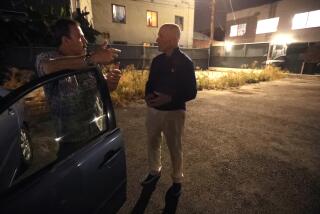Social Service, a Person at a Time
- Share via
When the homeless man had acid flung in his face by a driver who didn’t appreciate being asked for change, the door to Mark and Lonnie Heinemann’s small apartment was the logical one to knock on for help.
When the young transsexual with AIDS decided the street was not a good place to die, he chose the Heinemanns’ couch as the place to wait for eternity.
For more than 20 years now, Mark and Lonnie’s humble residence, wherever located, has been known among the homeless in the West Hollywood and Hollywood area as a place of refuge, a gateway between begging and working for a living. A place where, if you really mean it, a promise to lay off the drugs and booze and turn your life around can be exchanged for hot meals, clean clothes and a roof to sleep under.
While millions of Angelenos pass by the homeless every day, throwing quarters in cups out of obligation or guilt, Mark and Lonnie took a pledge in 1980 to do more. New in town and living at the St. Francis Hotel in Hollywood, they met a young homeless girl being forced into prostitution by a pimp.
The girl asked for help and, for the Heinemanns, it was a given to take her in.
After three months, she was able to move in with a boyfriend.
For Mark, 50, and Lonnie, 48, that experience led to a life-changing decision: to give a second chance to people who never really had a first.
“We said, ‘Look, all these people we’re seeing [on the street]. Someone’s gotta help them,’ ” Lonnie recalled.
Soon the couple met more strays, many too young to legally buy beer but already alcoholics or drug addicts. Those who expressed a genuine desire to be helped were taken in. Shortly, friends and people they’d helped started bringing others to them. Even police officers have sent a few their way.
To date, they have had more than 170 temporary tenants, Mark said.
Some stay for days, some for years, until they either get back on their feet, or go back to the street.
“We manage to save most of them, but not all,” he said, sitting in the couple’s small West Hollywood apartment. “They’ve had a second chance here. That’s the point.”
Sometimes, though, the itch for a high wins out. Once, the couple came home to find the apartment spotless, cleaned by a female addict who had been staying with them. On the table was a note of farewell: “Sorry, but I have to get back to the drugs.”
They never heard from her again. In fact, even most of the success stories don’t stay in touch. Mark’s theory is that most don’t want to be reminded of their past. “You know things about them that they don’t want you to know,” he said.
Mark and Lonnie pass some tenants on to the West Hollywood Gay and Lesbian Youth Center, or organizations such as the Jewish Federation and the AIDS Health Care Foundation. But the message the two are trying to send is this: You don’t need to be part of an organization to help people.
“Some think we’re crazy,” Lonnie said. Added Mark: “And some think we’re bleeding-heart liberals. And I’m neither.”
Rather, they are two people who, because of ailments that prevent them from working, decided to use their free time for something good.
Mark is a veteran, injured while patrolling the Demilitarized Zone between North and South Korea in 1969. Amid one of the many border clashes that erupted during that tense time, Mark fled in a Jeep. It hit a land mine and the vehicle landed on top of him.
Today, he has chronic back ailments and an irregular heartbeat. To stay alive, he takes a medicine that keeps his pulse rate around 50.
He also battles epilepsy, diabetes, tinnitus, a seizure disorder and a handful of other ailments. He spent two months this year in a wheelchair. In turn, he collects veteran disability checks of $197 a month, and $400 a month in Social Security. Lonnie, who also has epilepsy, gets $800 a month in Social Security.
About half of that goes toward rent. Much of the rest goes to the homeless. The couple collect clothes and other items to give away at food lines and parks. Last Sunday, a friend drove the Heinemanns to a church to hand out clothes, books--even a guitar--to about 30 people waiting to be served food.
“I’m trying, guys. It’s hard,” Mark said as people searched the pile of clothes for pants, shirts, socks, whatever they needed.
Mike Carriere had received clothes from the Heinemanns before. This time, he was lucky enough to get a suit.
“They’re great people,” he said. “They’re working with God.”
No one is staying with the couple now, but the items in their apartment tell the stories of those who came before. There are the pictures of Brian Spiagia, whose life they saved 18 years ago, and who they now refer to as “our son.”
The walls hold drawings made by some who have stayed there. In a closet, there are the suits and dresses they keep on hand for people who land job interviews.
A haunting documentary--made by Mark for a talk show he hosts on public access television--tells the stories of some of the tenants. One of the faces on the tape is that of Johnny Odle, who went by the name of Stephanie and contracted AIDS while turning tricks on the street dressed as a woman. His death certificate is in the Heinemanns’ filing cabinet. He spent his last five months in their apartment and died on their couch June 11, 1995.
Other stories have happier endings. Like that of Spiagia, who now works for a health care provider and keeps in regular contact.
“If it wasn’t for [Mark], I wouldn’t be here,” said Spiagia, 35. When he has extra clothes, he’ll bring them to Lonnie and Mark to give away. He has also brought about a dozen people to them for help.
Recently, the Heinemanns got stuck in Las Vegas because of the terrorist attacks. Mark had to get back the next day to take his heart medicine, so Spiagia took off from work to pick them up.
“It works two ways when you help people,” Mark said. “It’s not a one-way street.”
More to Read
Sign up for Essential California
The most important California stories and recommendations in your inbox every morning.
You may occasionally receive promotional content from the Los Angeles Times.










